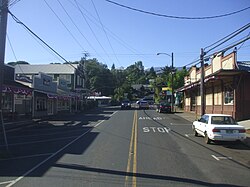Makawao, Hawaii
Makawao, Hawaii | |
|---|---|
 Looking up on Baldwin Avenue towards the Baldwin Ave/Makawao Ave/Olinda Road intersection | |
 Location in Maui County and the state of Hawaii | |
| Coordinates: 20°51′13″N 156°19′1″W / 20.85361°N 156.31694°W | |
| Country | United States |
| State | Hawaii |
| County | Maui |
| Area | |
• Total | 3.55 sq mi (9.18 km2) |
| • Land | 3.55 sq mi (9.18 km2) |
| • Water | 0.00 sq mi (0.00 km2) |
| Elevation | 1,578 ft (481 m) |
| Population (2020) | |
• Total | 7,297 |
| • Density | 2,057.81/sq mi (794.54/km2) |
| Time zone | UTC-10 (Hawaii-Aleutian) |
| ZIP code | 96768 |
| Area code | 808 |
| FIPS code | 15-48050 |
| GNIS feature ID | 0362090 |
Makawao is a census-designated place (CDP) in Maui County, Hawaiʻi, United States. The population was 7,297 at the 2020 census. Located on the rural northwest slope of Haleakalā, the community is known for being the hub of Upcountry Maui, a part of the island dominated by mostly agriculture and ranch land. Makawao Forest Reserve is to the east-northeast.
Geography
[edit]Makawao is located at 20°51′13″N 156°19′1″W / 20.85361°N 156.31694°W (20.853657, -156.316951).[2]
According to the United States Census Bureau, the CDP has a total area of 3.5 square miles (9.0 km2), all of it land.[3]
Demographics
[edit]| Census | Pop. | Note | %± |
|---|---|---|---|
| 2000 | 6,327 | — | |
| 2010 | 7,184 | 13.5% | |
| 2020 | 7,297 | 1.6% | |
| U.S. Decennial Census[4] | |||
At the 2000 census,[5] there were 6,327 people, 2,151 households, and 1,565 families in the CDP. The population density was 1,353.8 inhabitants per square mile (522.7/km2). There were 2,222 housing units at an average density of 475.5 per square mile (183.6/km2). The racial makeup of the CDP was 40.54% White, 0.32% African American, 0.55% Native American, 17.04% Asian, 8.74% Pacific Islander, 1.56% from other races, and 31.25% from two or more races. Hispanic or Latino of any race were 11.93% of the population.
Of the 2,151 households 41.4% had children under the age of 18 living with them, 51.7% were married couples living together, 14.8% had a female householder with no husband present, and 27.2% were non-families. 17.6% of households were one person and 4.6% were one person aged 65 or older. The average household size was 2.94 and the average family size was 3.34.
The age distribution was 29.6% under the age of 18, 7.9% from 18 to 24, 32.0% from 25 to 44, 23.4% from 45 to 64, and 7.2% 65 or older. The median age was 35 years. For every 100 females, there were 99.5 males. For every 100 females age 18 and over, there were 93.2 males.
The median household income was $46,681 and the median family income was $50,145. Males had a median income of $32,917 versus $26,955 for females. The per capita income for the CDP was $18,776. About 7.4% of families and 9.6% of the population were below the poverty line, including 10.7% of those under age 18 and 9.7% of those age 65 or over.

References
[edit]- ^ "2020 U.S. Gazetteer Files". United States Census Bureau. Retrieved December 18, 2021.
- ^ "US Gazetteer files: 2010, 2000, and 1990". United States Census Bureau. 2011-02-12. Retrieved 2011-04-23.
- ^ "Geographic Identifiers: 2010 Demographic Profile Data (G001): Makawao CDP, Hawaii". United States Census Bureau. Retrieved December 29, 2011.
- ^ "Census of Population and Housing". Census.gov. Retrieved June 4, 2016.
- ^ "U.S. Census website". United States Census Bureau. Retrieved 2008-01-31.
External links
[edit] Media related to Makawao, Hawaii at Wikimedia Commons
Media related to Makawao, Hawaii at Wikimedia Commons- City-Data on Makawao

